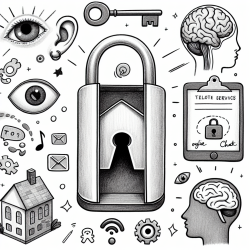Introduction
The COVID-19 pandemic has significantly impacted the mental health of adolescents worldwide. According to a recent review by Pillai, Patel, and Balkrishnan (2023), there is a notable increase in depression, anxiety, and eating disorders among adolescents during this period. This blog post aims to provide practitioners with actionable insights and strategies to mitigate these challenges and improve mental health outcomes for adolescents.
Understanding the Risk Factors
The review identifies several risk factors contributing to the deterioration of adolescent mental health during the pandemic:
- Reduction in Social Interaction: Social distancing and lockdown measures have led to decreased face-to-face interactions, exacerbating feelings of loneliness and isolation.
- Increased Workloads: The shift to online learning has increased academic pressures, contributing to stress and anxiety.
- Routine Shifts: Disrupted daily routines have affected sleep cycles and physical activity levels, impacting mental well-being.
- Social Media Usage: Excessive and negative social media consumption has been linked to increased anxiety and body image issues.
- Parental Involvement: Lack of parental support or increased parental stress can negatively affect adolescents' mental health.
Effective Prevention Strategies
Practitioners can implement several strategies to prevent and address mental health issues in adolescents:
- Promote Healthy Routines: Encourage regular sleep patterns, physical activity, and balanced nutrition to support mental well-being.
- Foster Social Connections: Facilitate safe opportunities for adolescents to maintain social ties, whether through virtual meetups or small, in-person gatherings.
- Educate on Social Media Use: Guide adolescents on responsible social media usage, emphasizing the importance of avoiding harmful content.
- Enhance Parental Awareness: Conduct workshops or provide resources to help parents understand the impact of their involvement and stress levels on their children's mental health.
- Implement School-Based Programs: Schools can play a crucial role by offering mental health education, counseling services, and peer support programs.
Encouraging Further Research
While the review provides valuable insights, ongoing research is essential to adapt strategies to evolving circumstances. Practitioners are encouraged to stay informed about the latest findings and consider participating in or supporting research initiatives that focus on adolescent mental health.
Conclusion
Addressing the mental health challenges faced by adolescents in the post-COVID-19 era requires a multifaceted approach. By understanding risk factors and implementing effective prevention strategies, practitioners can make a significant difference in the lives of young individuals. Continuous research and collaboration among educators, parents, and mental health professionals will be key to fostering resilience and well-being in adolescents.
To read the original research paper, please follow this link: Risk factors and strategies for prevention of depression, anxiety and eating disorders among adolescents during the coronavirus disease 2019 (COVID-19) pandemic: a review.










